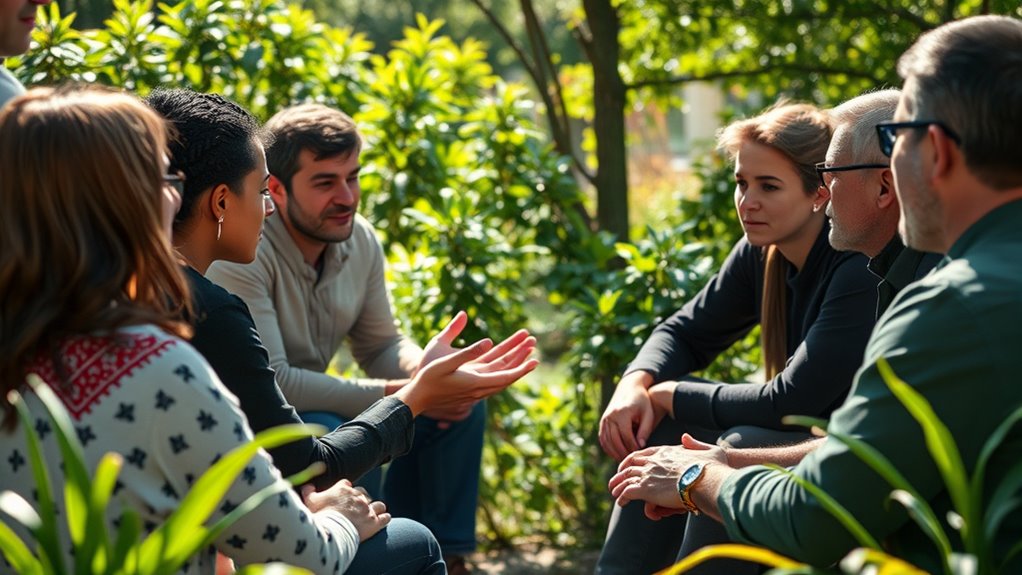To be a peacemaker in group disputes, focus on effective communication mediation by actively listening to all sides and maintaining neutrality. Create a safe space where everyone feels heard and understood, encouraging open dialogue. Clarify issues without blame and help others express their needs. Validate emotions to diffuse hostility and foster cooperation. By practicing these skills, you’ll help resolve conflicts constructively. Keep exploring how to master these techniques for more successful mediation outcomes.
Key Takeaways
- Practice active listening to ensure all group members feel heard and understood.
- Maintain neutrality to facilitate open dialogue without taking sides.
- Clarify issues by focusing on underlying needs rather than assigning blame.
- Validate emotions to reduce hostility and foster cooperation among participants.
- Encourage respectful communication and guide discussions toward common goals.

Effective communication often hinges on the skill of mediation, where a neutral party helps facilitate understanding between conflicting sides. When you’re stepping into a mediation role, your goal is to create a space where everyone feels heard and understood, paving the way for conflict resolution. To do this effectively, your ability to practice active listening is *essential*. This means giving your full attention to each person speaking, resisting the urge to interrupt, and truly understanding their perspective without immediately jumping to solutions or judgments. When people feel genuinely listened to, they’re more likely to open up, which helps uncover the root causes of the dispute.
As a mediator, you need to remain neutral, avoiding taking sides even if you personally have opinions about the conflict. Your role isn’t to decide who’s right or wrong but to facilitate constructive dialogue. When conflicts arise, tensions can run high, leading to misunderstandings or miscommunications. Your job is to calm those tensions by showing empathy and patience, encouraging each side to express their feelings and concerns clearly. Use effective listening techniques, such as paraphrasing what you’ve heard or asking clarifying questions, to demonstrate that you’re actively engaged and genuinely interested in understanding both parties.
In conflict resolution, clarity is *vital*. Help each side articulate their issues precisely without resorting to blame or accusations. Encourage them to focus on their needs and interests rather than attacking the other person. This shift in focus often reveals common ground that can be built upon. As you guide the conversation, make sure to acknowledge emotions without letting them control the discussion. Validating feelings can diffuse hostility and create a more cooperative atmosphere. Additionally, understanding key concepts like conflict dynamics can help you better navigate complex disputes and facilitate more effective resolutions.
Frequently Asked Questions
How Can Mediators Stay Neutral in Heated Disputes?
You can stay neutral in heated disputes by practicing impartial listening, which helps you focus on each person’s perspective without bias. Build empathy by understanding their feelings and concerns, showing you’re genuinely interested in resolving the issue. Keep your tone calm and avoid taking sides. This approach helps maintain your neutrality, encourages open communication, and fosters a safe environment where everyone feels heard and respected, ultimately guiding the group toward resolution.
What Are the Most Common Barriers to Effective Communication?
Ever think your brilliant message gets lost in translation? Language barriers and emotional triggers are the biggest culprits. You might speak clearly, but if words are misunderstood or emotions run high, communication crumbles faster than your patience. People get defensive, misunderstand intentions, and suddenly, you’re stuck in a cycle of frustration. Recognizing these barriers helps you address them, turning chaos into clarity and making sure everyone’s voice is finally heard.
How to Handle Non-Cooperative or Aggressive Parties?
When dealing with non-cooperative or aggressive parties, you should use de-escalation techniques like staying calm, listening actively, and avoiding provocation. Set clear boundaries to protect yourself and others, making it known what behavior is acceptable. Use a firm but respectful tone, and if needed, take a break to diffuse tension. Your goal is to maintain control while fostering a safe space for open dialogue.
What Skills Are Essential for Successful Mediation?
You need active listening and empathy building skills for successful mediation. Actively listen to each party’s concerns without interrupting, showing genuine interest. Build empathy by understanding their perspectives and feelings, which helps de-escalate tension. Use these skills to facilitate open communication, foster trust, and identify common ground. With patience and attentiveness, you can guide disputants toward mutually acceptable solutions, creating a peaceful resolution and strengthening group harmony.
How Does Cultural Background Influence Mediation Strategies?
Cultural cues can considerably shape your strategy, so stay sensitive to subtle societal standards and communication styles. Recognize that diverse cultural backgrounds dictate different norms, influencing how conflicts are expressed and resolved. By balancing respect and understanding, you can bridge gaps and build trust. Tailor your approach to honor these cultural nuances, fostering friendly, fruitful negotiations instead of friction, and ultimately, forging peace through personalized, perceptive mediation.
Conclusion
Remember, you hold the power to turn conflict into connection. By practicing active listening, staying calm, and seeking common ground, you become the bridge that brings understanding and peace. Think of yourself as the lighthouse in a storm—guiding others safely through turbulent waters. When you choose empathy over judgment, you illuminate a path toward harmony. So, step up as a peacemaker—your words can be the gentle tide that transforms discord into unity.









